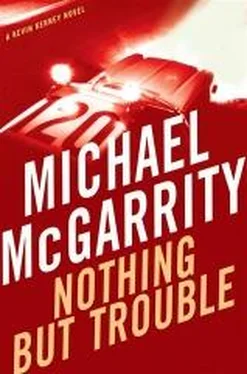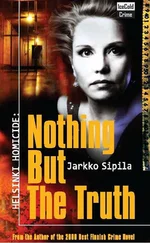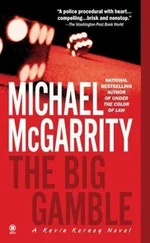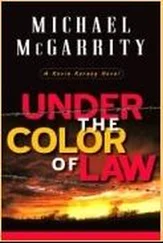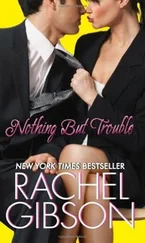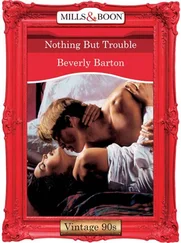Michael McGarrity - Nothing But Trouble
Здесь есть возможность читать онлайн «Michael McGarrity - Nothing But Trouble» весь текст электронной книги совершенно бесплатно (целиком полную версию без сокращений). В некоторых случаях можно слушать аудио, скачать через торрент в формате fb2 и присутствует краткое содержание. Жанр: Триллер, на английском языке. Описание произведения, (предисловие) а так же отзывы посетителей доступны на портале библиотеки ЛибКат.
- Название:Nothing But Trouble
- Автор:
- Жанр:
- Год:неизвестен
- ISBN:нет данных
- Рейтинг книги:4 / 5. Голосов: 1
-
Избранное:Добавить в избранное
- Отзывы:
-
Ваша оценка:
- 80
- 1
- 2
- 3
- 4
- 5
Nothing But Trouble: краткое содержание, описание и аннотация
Предлагаем к чтению аннотацию, описание, краткое содержание или предисловие (зависит от того, что написал сам автор книги «Nothing But Trouble»). Если вы не нашли необходимую информацию о книге — напишите в комментариях, мы постараемся отыскать её.
Nothing But Trouble — читать онлайн бесплатно полную книгу (весь текст) целиком
Ниже представлен текст книги, разбитый по страницам. Система сохранения места последней прочитанной страницы, позволяет с удобством читать онлайн бесплатно книгу «Nothing But Trouble», без необходимости каждый раз заново искать на чём Вы остановились. Поставьте закладку, и сможете в любой момент перейти на страницу, на которой закончили чтение.
Интервал:
Закладка:
“The telephone number belongs to a George McGuire,” he said with a knowing shake of his head. “It’s for a mobile phone bought here in Dublin under a prepay plan that was purchased three months ago. Records show that a number of text messages from that number were sent to Paquette’s computer, several as recent as two days ago, but no voice calls have been made.”
“When did he open the account?” Sara asked as the waitress brought coffee for her and hot tea for Fitzmaurice.
Fitzmaurice read off the date from his notes. “Of course, he used a fictitious mailing address on the mobile-phone contract and paid in cash.”
Sara grinned. “That date coincides with the information I got from the French authorities. According to Spalding’s travel bookings he was in Ireland during that time, supposedly on holiday, and he stayed for six weeks. What will it take to get access to Paquette’s e-mail account?”
Fitzmaurice added milk to his tea and stirred it. “A writ from an agreeable judge, which I think we can get by attesting that Paquette used illicitly gotten gains provided by a known fugitive to purchase property on his behalf. I have a detective on his way to the registrar of deeds and titles to pull the paperwork so we have the necessary documentation.”
“When will you be able to secure the writ?”
“By day’s end, I would hope.” Fitzmaurice leaned back in his chair, crossed his legs, and smiled broadly. “But there’s also another avenue we can pursue that may surely get your blood racing. If you’re right about Spalding wanting to settle here permanently, free to come and go as he pleases, he might well have either started or completed the process to claim Irish citizenship by virtue of descent. To accomplish it the documents would need to be in perfect order, but it would be well within the realm of possibility for him to do it.”
Sara leaned forward. “I’m all ears. Explain to me how it would work.”
“Anyone born outside Ireland can qualify for citizenship by submitting proof that at least one grandparent was born in Ireland. It requires making an application and including all the necessary birth, marriage, and death certificates to support the claim. Once everything has been confirmed, the applicant is entered into the Irish Register of Foreign Births and is eligible to apply for an Irish passport.”
“How can we find out about this?” Sara asked.
“Foreign-birth citizenship applications must be made through an Irish embassy or consulate in the country where the person resides,” Fitzmaurice said. “Inquiries have already been made to our French and English embassies, asking if a George McGuire has applied, and we’re querying all the others through the Department of Foreign Affairs. But remember, Spalding may not have started the process. He could be still at the point of trying to find someone willing to sell, for an agreeable sum of money, a dead grandparent’s name he could use, or paying an intermediary to do it for him.”
Sara smiled at an elderly couple who nodded a greeting as they trailed the hostess to an empty table. “Now that we know about Spalding’s earlier visit, shouldn’t we do a search of birth-certificate requests made during the time he was here?”
Fitzmaurice finished his tea. “Yes, of course, but it may be a while before we learn anything. Requests for birth certificates can be made either through the Registrar General’s Office here in the city, or directly to one of the county offices.”
Sara motioned for the waitress to bring the check. “How many counties are there in Ireland?”
“Twenty-six in the Republic and six in Northern Ireland. But the records of Irish ancestors born in the north before 1922 are kept by the Registrar General’s Office, which is nearby. We’ll make a quick stop on our way to Dun Laoghaire and ask them to get cracking on it.”
Sara signed the charge slip and stood. “Although a hint of a brogue is in your voice, sometimes you sound more British than Irish.”
“Do I, now?” Fitzmaurice said with a chuckle as he walked Sara through the lobby. “I suppose it’s because I come from one of those Anglo-Irish families that embraced Catholicism and drew Oliver Cromwell’s ire. In his zeal to transform Ireland into a Protestant colony of the British Empire, he either reduced us to poverty or drove us into exile. It’s taken us a few hundred years to work our way back into polite society.”
Sara laughed. “As far as I’m concerned, you’re excellent company to keep, Hugh Fitzmaurice.”
“As are you, Colonel Sara Brannon, although it pains me to know so little of your real reason for being here.”
“I’ll try not to cause you any trouble,” Sara said as she slid into Fitzmaurice’s unmarked Garda car.
Chapter Eight
The short drive from Dublin to Dun Laoghaire reminded Sara of the sprawl of large American cities where suburban towns and once rural villages, now surrounded by commercial and residential development, had been absorbed and become virtually indistinguishable from one another.
Granted, there were differences between Dublin and the States: The architectural styles of the spreading residential subdivisions paid homage to a Georgian, Palladian, Victorian, and Irish cottage heritage, and in many cases the houses were smaller and squeezed onto tiny lots. There were lovely old buildings scattered about in parkland meadows cut by cobblestone drives, and the new commercial buildings had a distinctly European minimalist flair. The Irish Sea, the coastal hills, and the remaining open space soothed the eye, but there was construction everywhere. Roads, subdivisions, shopping centers, and business parks were eating away at the edges of the intact village centers and gobbling up the land.
When Sara mentioned this to Fitzmaurice, he railed against the development, pointing out that the old family-run bakeries, fish-and-chips takeaways, butcher shops, grocery stores, and ice cream parlors were nigh on gone, swept aside by fast-food franchises, gimmicky tourist enterprises, and big-box shopping malls with huge car parks that catered to the relentless consumption of a nation gone mad with consumerism.
“The whole bloody Republic is being turned into an Irish theme park,” he added with a huff.
Sara smiled sympathetically but said nothing. Fitzmaurice sounded just like Kerney complaining about the changes in Santa Fe and northern New Mexico. If the two men ever had a chance to meet, she thought they would hit it off immediately.
They arrived in Dun Laoghaire, which, according to Fitzmaurice, had been a sleepy village in the early nineteenth century until the railroad arrived and a harbor had been dredged to accommodate mail ships that crossed the Irish Sea to Holyhead in Wales. Now it was not only a popular day-trip destination for tourists staying in Dublin, but also home to the largest ferry crossing to and from the UK, a retreat for the wealthy who maintained vacation homes in the area, and a bedroom community for people who worked either in the city or in the resort towns that ran along the southeast coast.
The area promoted itself as Dublin’s Riviera, compared itself to Naples, Italy, and had no industry other than tourism, which was offered up, as Fitzmaurice put it, to all those gullible people who came looking for the charm of Old Eire while turning a blind eye to the neighborhoods where the poor resided and street gangs roamed.
From the road the villa Paquette had bought looked like nothing more than a cottage painted a soft pastel blue. But from the end of the line of houses that followed the curve of the bay, Sara could see that it extended four stories down a cliff face to a rocky beach and a slipway where pleasure boats rocked gently against a pier. Terraced gardens of palm trees and brilliant flowers flowed down the cliff almost to the shore.
Читать дальшеИнтервал:
Закладка:
Похожие книги на «Nothing But Trouble»
Представляем Вашему вниманию похожие книги на «Nothing But Trouble» списком для выбора. Мы отобрали схожую по названию и смыслу литературу в надежде предоставить читателям больше вариантов отыскать новые, интересные, ещё непрочитанные произведения.
Обсуждение, отзывы о книге «Nothing But Trouble» и просто собственные мнения читателей. Оставьте ваши комментарии, напишите, что Вы думаете о произведении, его смысле или главных героях. Укажите что конкретно понравилось, а что нет, и почему Вы так считаете.
